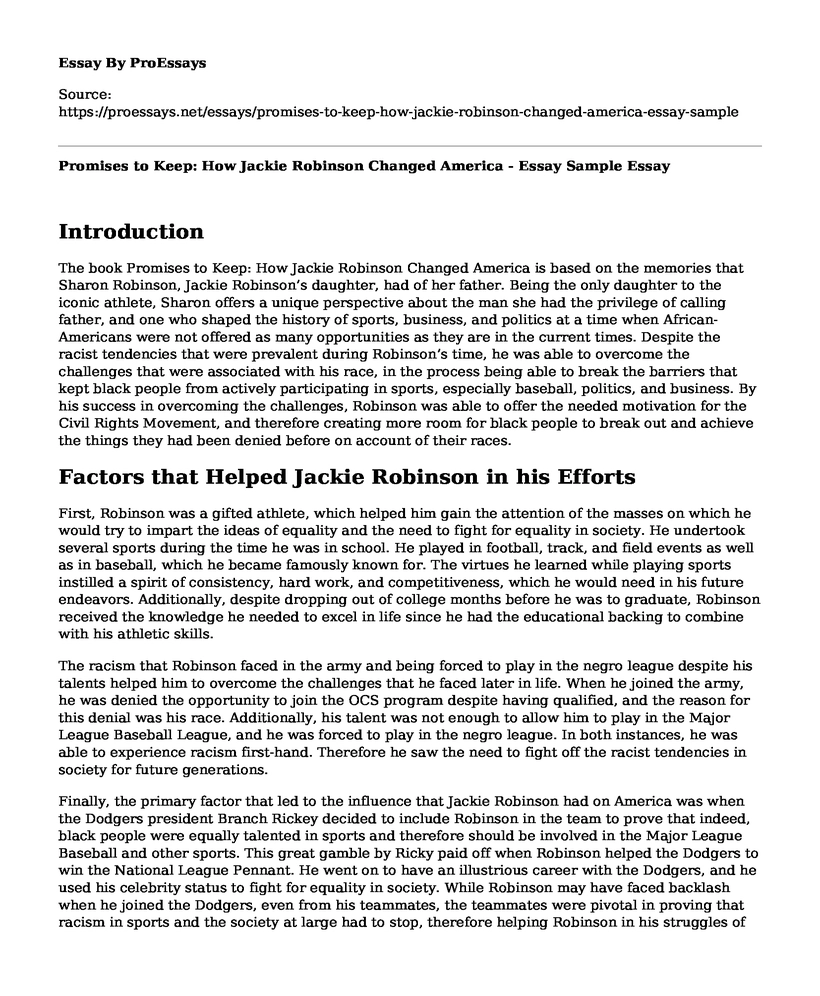Introduction
The book Promises to Keep: How Jackie Robinson Changed America is based on the memories that Sharon Robinson, Jackie Robinson’s daughter, had of her father. Being the only daughter to the iconic athlete, Sharon offers a unique perspective about the man she had the privilege of calling father, and one who shaped the history of sports, business, and politics at a time when African-Americans were not offered as many opportunities as they are in the current times. Despite the racist tendencies that were prevalent during Robinson’s time, he was able to overcome the challenges that were associated with his race, in the process being able to break the barriers that kept black people from actively participating in sports, especially baseball, politics, and business. By his success in overcoming the challenges, Robinson was able to offer the needed motivation for the Civil Rights Movement, and therefore creating more room for black people to break out and achieve the things they had been denied before on account of their races.
Factors that Helped Jackie Robinson in his Efforts
First, Robinson was a gifted athlete, which helped him gain the attention of the masses on which he would try to impart the ideas of equality and the need to fight for equality in society. He undertook several sports during the time he was in school. He played in football, track, and field events as well as in baseball, which he became famously known for. The virtues he learned while playing sports instilled a spirit of consistency, hard work, and competitiveness, which he would need in his future endeavors. Additionally, despite dropping out of college months before he was to graduate, Robinson received the knowledge he needed to excel in life since he had the educational backing to combine with his athletic skills.
The racism that Robinson faced in the army and being forced to play in the negro league despite his talents helped him to overcome the challenges that he faced later in life. When he joined the army, he was denied the opportunity to join the OCS program despite having qualified, and the reason for this denial was his race. Additionally, his talent was not enough to allow him to play in the Major League Baseball League, and he was forced to play in the negro league. In both instances, he was able to experience racism first-hand. Therefore he saw the need to fight off the racist tendencies in society for future generations.
Finally, the primary factor that led to the influence that Jackie Robinson had on America was when the Dodgers president Branch Rickey decided to include Robinson in the team to prove that indeed, black people were equally talented in sports and therefore should be involved in the Major League Baseball and other sports. This great gamble by Ricky paid off when Robinson helped the Dodgers to win the National League Pennant. He went on to have an illustrious career with the Dodgers, and he used his celebrity status to fight for equality in society. While Robinson may have faced backlash when he joined the Dodgers, even from his teammates, the teammates were pivotal in proving that racism in sports and the society at large had to stop, therefore helping Robinson in his struggles of achieving a nation that was free from racism. Indeed, the issues Robinson faced only proved to strengthen him.
Cite this page
Promises to Keep: How Jackie Robinson Changed America - Essay Sample. (2023, Aug 21). Retrieved from https://proessays.net/essays/promises-to-keep-how-jackie-robinson-changed-america-essay-sample
If you are the original author of this essay and no longer wish to have it published on the ProEssays website, please click below to request its removal:
- History of Aesthetic Styles - Essay Example
- Should Americans Believe in a Unique American 'Mission'?
- Paper Example on Renaissance Art
- Bartolome de las Casas: New World Social Reformer Annotated Bibliography
- Feminist Critique on Frankenstein Essay Example
- Essay Example on UAE and South Korea: Strengthening Diplomatic Relations
- Past and the Present in the Novel the Kite Runner - Essay Sample







